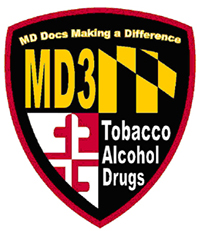MD3 Didactic Lecture Series
ADDICTION 101: An overview of the phenomenology of substance use disorders and the neurobiology of addiction. Given that there is a wide variation in education about substance use disorders in medical schools, it is essential to provide residents with this basic information to reinforce the “disease concept” of addiction. It also offers an arena for residents to explore their negative attitudes toward addiction and individuals with addictive disorders. This will also cover the differences between use, abuse, dependence and the process of how individuals initiate substance use and progress to addiction as well as the process of change and recovery from substance abuse.
SUBSTANCES OF ABUSE: A review of the common substances of abuse, typical amounts used, and their routes of administration. As many residents come to UMMC from various other parts of the country, many are unfamiliar with specific drug use trends seen in Baltimore (such as heroin). In addition, this lecture reviews the types and quantities of alcohol consumed with reference to the concept of the “standard drink” used in assessment of alcohol use. Familiarity with the substances enables the residents to more easily assess substance misuse in their patients.
ALCOHOL: Alcohol contributes to more morbidity and mortality than all illicit substances combined. This lecture reviews various aspects of alcohol use disorders and risky drinking including epidemiology, co-morbidities, and medical complications. It also addresses the pharmacologic management of alcohol withdrawal as well as maintenance medications that can help patients reduce or discontinue use of alcohol.
NICOTINE: Nicotine contributes to more morbidity and mortality than all illicit substances combined. This lecture reviews various aspects of nicotine dependence including the epidemiology, co-morbidities, medical complications, and pharmacologic and non-pharmacologic interventions too assist patients with smoking cessation.
MEDICAL & PSYCHIATRIC COMORBIDITY: This lecture addresses the association (both complications and co-morbidities) of medical and psychiatric conditions with substance use and substance use disorders including alcohol, nicotine, illicit drug, and prescription drug abuse. Many physicians may not initially recognize a patient’s substance use disorder as a primary problem that they can address but they may be able to recognize the impact of the substance use on the other medical problems that they are managing. Articles from the PRISM (Primary Care Research in Substance Abuse and Mental Health) project will be used in integrating substance abuse education into the various disciplines.
MAINTENANCE MEDICATIONS: Overview of prescribing effective medications to treat craving and prevent relapse. Currently FDA-approved “maintenance” medications for nicotine (nicotine replacement therapy; bupropion; varenicline), alcohol (disulfiram, naltrexone, acamprosate) and opioid (methadone, buprenorphine, naltrxone) dependence are underutilized in many primary care settings. This lecturereviews the use of the various medications and emphasize the particular issues that apply to the various specialties. Given the high prevalence of heroin use in Baltimore and the unique federal regulations that dictate the use of methadone and buprenorphine, special attention is paid to these medications.
MANAGEMENT OF INTOXICATION & WITHDRAWAL: Review of procedures/medications used for the management of intoxication/overdose and withdrawal for alcohol and other drugs. This is a highly relevant topic in the in-patient hospital population, especially with life-threatening withdrawal from alcohol and benzodiazepines, and heroin withdrawal, both in adults and neonates born to addicted mothers.
PRESCRIBING CONTROLLED SUBSTANCES Review of appropriate prescribing practices for opioids and other controlled medications. With the dramatic increase in misuse of and dependence on prescription medications (primarily opioids, benzodiazepines and stimulants) it is crucial for physicians to learn proper prescribing techniques as well as ways to deal with patients who appear to be misusing medications that they otherwise need to take.
CHRONIC DISEASE MANAGEMENT/TOXICOLOGIC SCREENING: Overview of ongoing medical management of outpatients with substance related problems. In the primary care setting, chronic disease management is commonly done with disorders such as diabetes and hypertension but rarely with substance abuse and dependence. This lecture teaches the residents practical skills to utilize with patients (such as 12-step facilitation) as well as basic principles of toxicology screening (urine, saliva, hair, sweat, serum). Residents learn the limitations of standard testing as well as the causes of common false positive and negative results.
CHRONIC PAIN & ADDICTION: Reviews typical cases of narcotic pain medication misuse and dependence and the rapid rise in the number of new prescriptions and increased misuse among at risk populations. Aims to help residents identify high risk populations and consider several underlying reasons for pain medication misuse. Also reviews the increasing prevalence of opioid medication misuse in the context of the rise in narcotic pain medication prescribing.
ADOLESCENT SUBSTANCE ABUSE & THE DEVELOPING BRAIN: Overview of the individual and family risk and protective factors for adolescent substance use, abuse & addiction in a developing brain. Also teaches residents how to discuss important risk & protective factors of early adolescent substance experimentation and progression to abuse & addiction with teens and their parents.
CHRONIC DISEASE MANAGEMENT/TOXICOLOGIC SCREENING: Overview of ongoing medical management of outpatients with substance related problems. In the primary care setting, chronic disease management is commonly done with disorders such as diabetes and hypertension but rarely with substance abuse and dependence. This lectureteaches the residents practical skills to utilize with patients (such as 12-step facilitation) as well as basic principles of toxicologic screening (urine, saliva, hair, sweat, serum). Residents learn the limitations of standard testing as well as the causes of common false positive and negative results.
SUBSTANCE USE DISORDERS IN PHYSICIANS: Substance use disorders in physicians and other medical professionals are covered. Because these disorders are at least as common in physicians as the general public, we also include didactic teaching on the risk factors, identifying an impaired colleague and ways to intervene.

